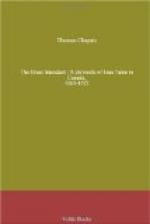For a long while this important question divided and agitated the Canadian people. The religious authorities, knowing the evil and crimes that resulted from the sale of intoxicating liquor to the Indians, made strenuous efforts to secure the most severe restriction if not the prohibition of the deadly traffic. They spoke in the name of public morality and national honour, of humanity and divine love. The civil authorities, more interested in the financial and political advantages than in the question of principle, favoured toleration and even authorization of the trade. Hence the conflicts and misunderstandings which have enlivened, or rather saddened, the pages of Canadian history.
It is to be regretted that the intendant Talon sided with the supporters of free traffic in brandy. We have said that at first he wavered. The rulings of the Sovereign Council in 1667 seem to show it. But his earnest desire for the prosperity of the colony—the development of her trade, the increase of her population, the improvement of her finances—his ambition for the economic progress of New France, misled him and perverted his judgment. This is the only excuse that can be offered for the greatest error of his life. For he must be held responsible for the ordinance passed by the Sovereign Council on November 10, 1668. This ordinance, after setting forth that in order to protect the Indians against the curse of drunkenness it was better to have recourse to freedom than to leave them a prey to the wily devices of unscrupulous men, enacted that thereafter, with the king’s permission, all the residents of New France might sell and deliver intoxicating liquor to the Indians willing to trade with them. The gate was opened. It was in vain that the ordinance went on to forbid the Indians to get drunk under a penalty of two beavers and exposure in the pillory. A fearful punishment indeed!
Talon’s good faith was undeniable. On this occasion he doubtless thought that he was still serving the cause of public welfare. But, without questioning his intentions, we cannot but admit that his life’s record contains pages more admirable than this one.
CHAPTER VI
TALON AND THE CLERGY
In the instructions which Talon had received from Louis XIV on his departure from France in 1665 it was stated that Mgr de Laval and the Jesuits exercised too strong an authority and that the superiority of the civil power should be cautiously asserted. The intendant was quite ready to follow these directions. He had been reared in the principles of the old parliamentarian school and was thoroughly imbued with Gallican ideas. But at the same time he was a sincere believer and faithful in the performance of his religious duties. It is not surprising, therefore, that he should be found ever earnest in his endeavours to promote the extension of Christianity and ready to protect the missionaries, as well as the charitable and educational institutions, in their work. Neither is it surprising that he should sometimes seem jealous of ecclesiastical influence in matters where Church and State were both concerned.




